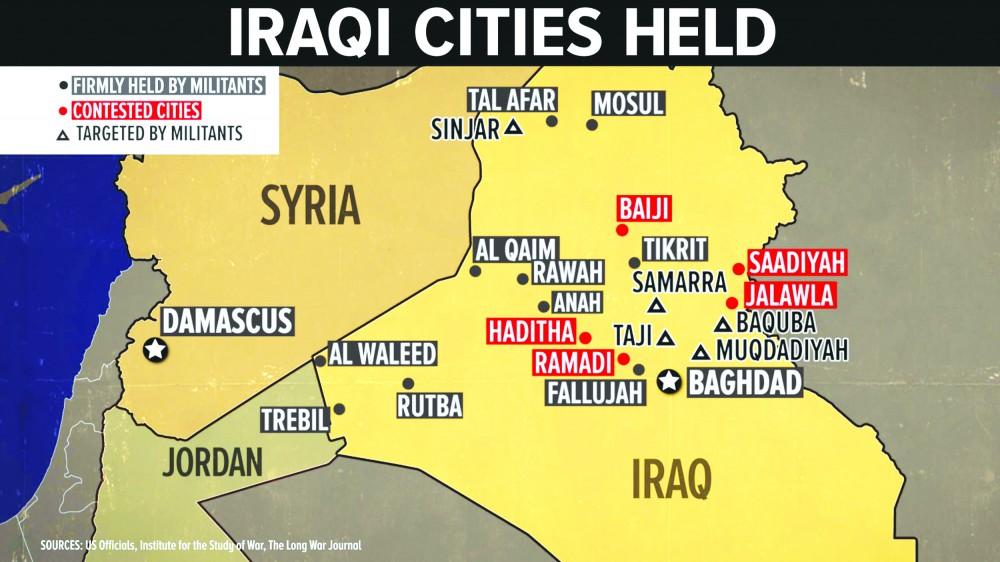Six questions you were too afraid to ask about ISIS

GVL / Courtesy – NBC News
Sep 28, 2014
What is ISIS?
ISIS stands for the Islamic State of Iraq and Syria. Jonathan White, professor of interdisciplinary studies at Grand Valley State University and a consultant to state, local and federal governments, said they are a disenfranchised Ba’athist militant group led by an Iraqi, Abu Bakr al-Baghdadi.
White said they originally emerged in 2006 and according to Terrorist Research & Analysis Consortium (TRAC), it “evolved in one of the main jihadist groups fighting government forces in Syria and Iraq.”
White said they maintain a rule by terror.
ISIS, lead by al-Baghdadi, is a collection of insurgent groups including Saddam Hussein’s military officers and street thugs.
What is ISIL; are they the same thing?
“ISIL includes Lebanon and what used to be Greater Syria,” said White. “ISIS is Iraq or Syria.”
White said the group only cares about the “Islamic State” portion. He added that it is acceptable to call the group ISIS or ISIL.
What is ISIS’ goal?
White said their stated goal is to have the caliphate restored.
“The political goal for sheiks is to keep their (Sunni) tribes from being massacred,” said White. “They do not want to be dominated by Shi’ites.”
History professor, Chad Lingwood, said that one school of thought is that the caliphate has been resurrected to “reawaken” Islam.
“When there were caliphs, that is to say, from the seventh through the 13th century, Muslim societies were, generally speaking, much more advanced and prosperous than neighboring non-Muslim societies,” said Lingwood.
Lingwood said ISIS may equate the caliphate with those early centuries in Islamic society.
What is a caliphate?
Lingwood said the caliph is the person deemed most qualified by Muslims to be the successor of Muhammad as the leader of the Muslim community.
“This official title is normally associated with the Sunni tradition within Islam,” Lingwood said. “In general, Shi’ite Muslims, who are a minority within the tradition, do not acknowledge the legitimacy of the caliphate. Their religious leaders were called imams, and were direct descendants of Muhammad, usually through his daughter, Fatima.”
Lingwood said the caliph, or caliphate, has long been a divisive issue among Muslims.
Should the United States be frightened?
White said ISIS is a regional threat, but they are our concern because they threaten the United States’ best allies in the area, the Kurds.
“They have potential to become an international threat,” White said. “But only a low level threat, by getting people to mimic them and doing random acts of terrorism.”
President Barack Obama said the threat of ISIS should not scare Americans.
“When you harm our citizens, when you threaten the United States, when you threaten our allies, it doesn’t frighten us. It unites us,” Obama said in a recent press conference.
White agrees with the president.
“A few guys with bombs are not going to overthrow the U.S.,” he said.
Will they last?
White said most experts believe that ISIS is at the height of their ability to expand.
“Mainstream Muslims are against them,” he said.
White also said that because of the unusual alliances and the many groups that form it, it won’t last.
Lingwood said that among groups and individuals classified as extremists or militants, “there has been a call to re-establish the Muslim caliphate.”
Lingwood believes this is unlikely because throughout Islamic history caliphs have been overthrown and challenged.
“The notion that simply having a caliphate will necessarily bring about harmony, piety, justice and prosperity is not reflected in Islam’s history,” Lingwood said. “This, I think, is something ISIS does not realize.”
White said they could only be eradicated completely if a military occupation occurred with large military powers.
“Terrorism is here to stay,” White said. “All you need is a group that is irritated that has access to weapons and the ability to travel.”























